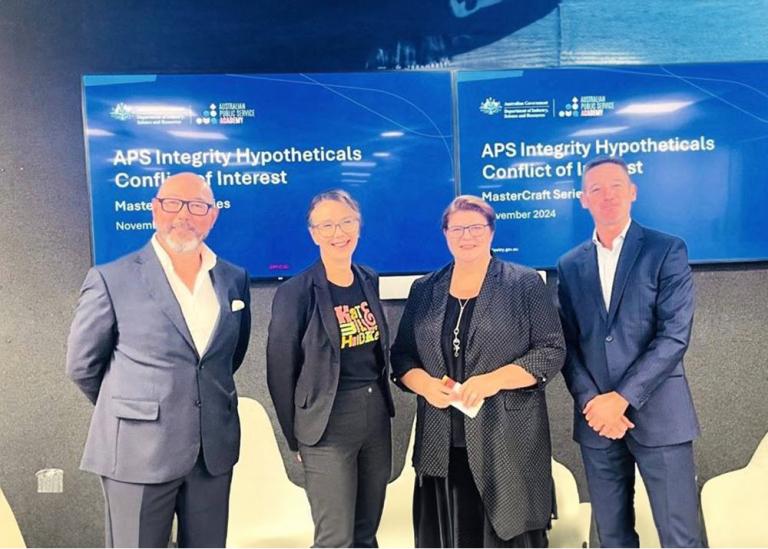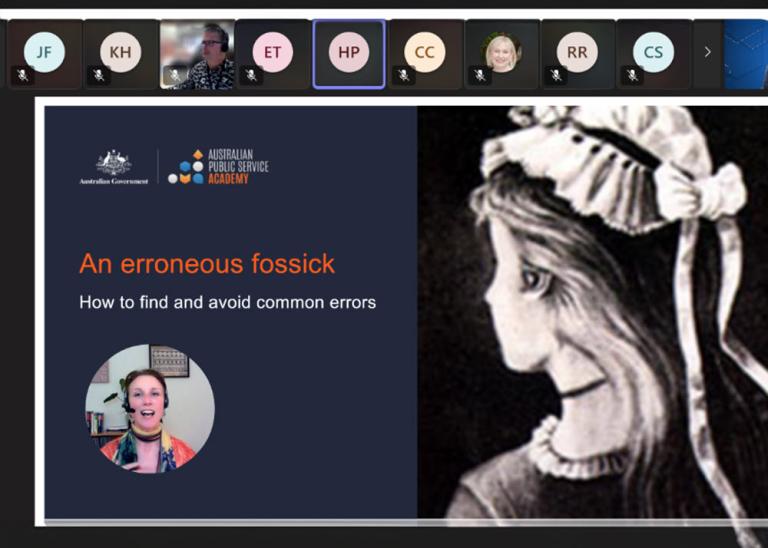By Anthony Dusan | APS Academy
During November, the APS Academy held a number of a MasterCraft Series events. We spotlight two of these in this article: one on ‘integrity’ and the other on ‘writing in the APS’.
The integrity MasterCraft Series event was framed around a series of ‘hypothetical’ scenario’s centred on the theme of ‘conflict of interest’ and how public servants might respond in given situations. APS Integrity Hypotheticals – Conflict of Interest saw three senior public service executives share the integrity spotlight in answering how they would address the circumstances put to them. It highlighted the grey (and not so grey) areas of decision making and what public servants should consider when confronted with similar positions or how to approach decisions in general with integrity.
The panel comprised of Sam Chard, PSM, Head of Division, Business Grants Hub at the Department of Industry, Science and Resources; Miranda Lauman the First Assistant Secretary of the Workforce Australia for Business Division, Employment and Workforce Group at the Department of Employment and Workplace Relations; and Gary Rake the CEO of the Australian Building Codes Board, were each given an opening set of ‘facts’ that were subsequently layered upon to become more complex, grey and provocative. The host, Rodney Lee Walsh was quick to dive into a scenario, that at first sight might look simple and clearly not like a conflict of interest. And with each layer of information, turning it into a scenario in which it was harder to be sure whether it fell into a conflict of interest or not.
A key message here was that the boundaries of conflicts of interest are rarely straight forward. What should we do about this? One of the analogies raised by the panel was the action of ‘shining a light’ on an issue, and that it was important to use ‘many torches’ to unhide the shadows. The implication being: to get advice from a number of people, not just one to give you a greater chance of transparency in your decision-making.

The lively audience posed over 90 questions to the panellists that covered a broad range of areas from ‘actual’ to ‘perceived’ conflicts of interest like, “Whose perception is valid in terms of a perceived conflict of interest? Is it still the old pub test?”, “How does seniority impact conflicts? Does ability to influence government decisions or access to information come into consideration?” or “If I invest in a managed fund, like an exchange traded fund, and I don’t know what the investments are made in, do I need to declare a conflict?” Join the other 1,450 staff from 90 agencies across the APS to hear this all for yourself through the recording that is now available on APSLearn.

The Writing in the APS MasterCraft Series event focused on how to write in the APS and ‘how to make writing clear and effective’. The esteemed panel was comprised of Emily Thorpe from Services Australia as well as being a former writer for the Australian Government Style Manual; Matthew Fenwick, a content strategist and trainer from the Department of Defence; and Helen Portillo-Castro from Ethos CRS.
The panel presented on:
- how plain language helps you to write for your readers
- the importance of content structure
- common errors in government writing and how to avoid them and
- navigating clearance and working with subject matter experts.
Interests of the audience were also practically orientated, with a strong interest in tips and tricks on how to get better at writing. This came through in questions like, “…any tips for writing efficiently without compromising quality/clarity…” and “…suggestions on how to approach editing…” or “…helpful advice for writing ministerial briefs…”. It highlighted that staff are seeking to improve communication in written form whether for Ministerial briefs, reports to senior executives or more effective emails.
If you’re keen to build your writing capability – join the other 1,285 staff from 87 agencies who attended the session by viewing the recording of this event on APSLearn.




